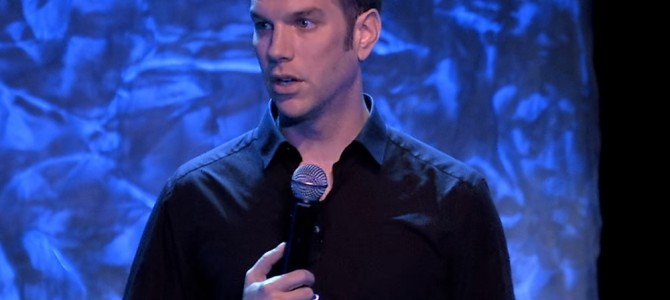
Comedian Anthony Jeselnik deleted a tweet. Once. It was about the Boston Marathon bombing, on the day of the bombing, and his boss at Comedy Central called and demanded he delete it lest he be fired. Initially, Jeselnik refused. Then his boss pointed out that if he were fired and his show cancelled, then the rest of his cast and crew would also find themselves without work. So Jeselnik relented.
In his new Netflix special, Jeselnik explains why he made that joke on the day of the tragedy, just as he did on the day of the theater shooting in Aurora, Colorado. It’s not that he finds such moments humorous—he does not—but that he is outraged by the standard day-of-the-tragedy social media post: “Thoughts and prayers.” Hence, the title of his new special, “Thoughts and Prayers.”
In the hour-long show, featuring 40 minutes of dark stand-up and 20 minutes of personal stories about his approach to comedy, Jeselnik leaves no lines uncrossed. He embodies the advice of George Carlin, who said the role of a comedian is to find such lines and “cross them deliberately.” Jeselnik definitely identifies them before proceeding to trounce over them with reckless abandon. But in a day and age when thoughtcrime is real, we need comedians unbound by boundaries, brave souls who will stroll around a stage and make jokes about dead babies.
‘I Don’t Tell Dark Jokes’
Umm, yeah. Saying Jeselnik will trounce over any line is not an understatement. He opens the show with a joke that may lead to a dead baby—though it doesn’t, just an injured one—then segues into a bit about how horrible “Tears in Heaven” is. Then he casually strolls into a hilarious turn mocking the comedic prowess of women. And that’s just the first couple of minutes.
From there, he’s off and running, and no topic is taboo—Hitler, fighting with his girlfriend, attempted drownings, racism, awful eulogies. Jeselnik will go there and, even when you think you figured out the formula and know just how awful the next punchline is, veer in another direction altogether.
Part of it is his on-stage persona, all ego and smirk and misdirection, but the other part of it is that he is simply a dark individual who will make you laugh at terrible jokes that you probably shouldn’t—at least, not publicly. It’s not a gimmick, though. As Jeselnik says in “Thoughts and Prayers,” “I don’t tell dark jokes because I’m a comedian. I’m a comedian because I tell dark jokes.”
In An Era Of Microaggressions, Go Macro
Of course, he’s not alone in the comedy world when it comes to dark humor. He is, however, alone when it comes to his skill at dark humor. Whereas the Sarah Silvermans and David Crosses of the comedy world will cross boundaries, it’s more political. Even Patton Oswalt, who has a heterodox position on guns, remains squarely and openly in the liberal camp.
With Jeselnik, you suspect his leanings, but it’s not part of the act. The special isn’t political preening disguised as comedy. It’s a punch into the darker recesses of your mind as you find yourself genuinely laughing at a joke that starts off discussing money before going full-metal Godwin.
In our sanitized and faux-polite world, one in which being offended by opinions is defined not as a personal problem but as an offense by the opinion-holder, we have to go full-metal Godwin. We have to step outside the bounds of polite discourse and just get raw. Otherwise, we risk retreating into a soft puddle of meaninglessness, where all we do is smile and nod lest we get a call from our boss threatening to fire us for something we said.
The Hero Gotham Deserves
For that reason, Anthony Jeselnik is a hero. He’s the one we need and the one we deserve. He is a man who will endure insults and death threats—not just to himself but also to his family—to deliver terrible, awful, hilarious jokes with a sly smile on his face.
It’s no mistake that he filmed “Thoughts and Prayers” in San Francisco. It’s ground zero for the friendly fascism that is concomitant to political correctness. For a comedian like Jeselnik, it was the natural choice. If you’re going to walk into the lion’s den, find the biggest one you can and walk in with the tour guide who helped take out Cecil.
As to his predilection for joking as soon as possible on the day of a tragedy, Jeselnik comes across more as an heir to G.K. Chesterton than to Lenny Bruce. It was Chesterton, after all, who made the following observation in “The Man Who Was Thursday”: “‘Do you understand,’ said the other, ‘that this is a tragedy?’ ‘Perfectly,’ replied Syme; ‘always be comic in a tragedy. What the deuce else can you do?’”









